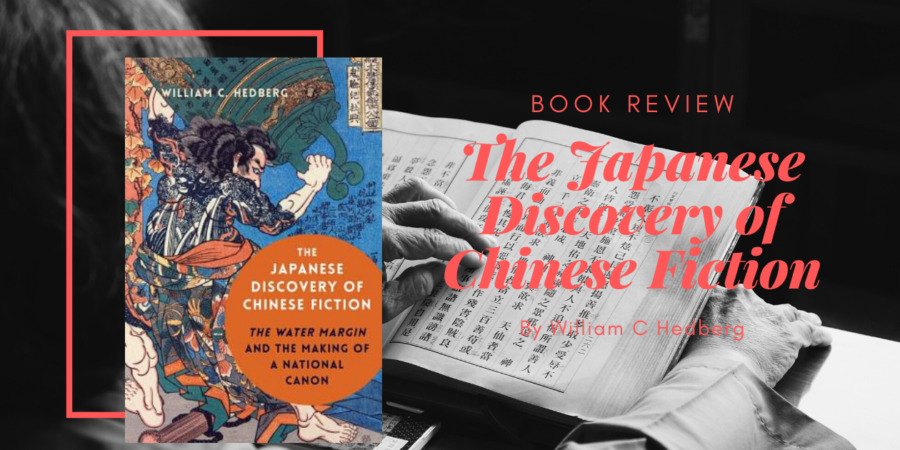The Japanese Discovery of Chinese Fiction is one of the library’s latest ebook acquisitions and hence featured in the “new arrivals” section. That section is also pretty prominent in the Overdrive app, which is how I found, and promptly downloaded, the book. It’s not The Tale of Genji, but I thought it might be interesting to see how the Japanese were influenced by Shuihu Zhuan and if anything in here could be applied to the Chinese influences in The Tale of Genji.
What I found in this book was four chapters of incredibly dense, academic writing. I thought that I was getting used to academic writing, but I was clearly wrong. For example, there’s a guide to Shuihu Zhuan (The Water Margin) which is described as an attempt to establish “a new methodology for the study of contemporary language and culture that combined the empirical focus of professional interpretation with the systematic exegetical rigor of classical studies.”
But I told myself that the book would be worth it and after a break to actually read Shuihu Zhuan (in English! If I read it in Chinese the library loan would have expired 100 times) and with lots of notes to help with my understanding (because note-taking forces me to slow down and think about what is worth recording), I managed to make it through.
In essence, The Japanese Discovery of Chinese Fiction looks at the Japanese reception of Shuihu Zhuan (Water Margin) and how that affected various academic fields in Japan and the Japanese perception of China. Or, in the words of the author, this book is “informed by recent efforts to rethink the ‘impact-response’ model inherited from earlier kokubungaku paradigms, in which we begin with a Chinese text, genre, or motif and explore the processes by which it is adapted and reworked into something quintessentially Japanese“.
The main points, as I understood it, were:
- When Shuihu Zhuan first arrived in Japan, it was debatable how much the Japanese actually understood. They certainly collected the texts, but did they read it?
- The shift towards “vernacular philology” like Shuihu Zhuan marks a shift in the orientation of the way the Japanese literati thought of China and its textual culture, “one premised on the belief in a fundamental and unbridgeable rupture separating the language and culture of the present and that of antiquity”.
- And anyway, people may not have been able to even get a copy of Shuihu Zhuan – so during the Edo period, the people who read Shuihu Zhuan would have read them in the commentary versions.
- Eventually people started thinking that Shuihu Zhuan was an excellent way of understanding China and started writing lots of commentaries on that.
- According to Kainan: “Shuihu zhuan is ideal for getting a sense of the uniqueness of the Chinese people, but it’s neither a historical novel [rekishi shosetsu] nor a novel of sentiment [ninjo shosetsu]; instead, it straddles the line between the two.”
- According to the author, Shuihu zhuan acted as a “privileged point of insight into a putative Chinese character that acted as both foil and supplement to Japanese modernity.”
- All this took place as the field of bungakushi was developed.
Three points that I thought were interesting:
- A timeless quote about the importance of understanding China. A 1908 translation of the book by Ito Gingetsu comes with a preface by the translator that states: “In the future, China will serve as a wedge for the peace and stability (or lack thereof) of the entire globe. Any country that has faith in its status as a global power will express its ambitions with respect to China […] Any country that fails to appreciate the importance of solving the China problem is a powerless country, and any citizenry that fails to realise the responsibility it has to research China is a powerless people.” These words were written over a hundred years ago but I think they still hold true today.
- Michael Emmerich’s definition of ‘replacements’* – “all translations, adaptations, and material artefacts” that are read in place of the “(unknown and unknowable) original.” In this sense, many, if not most, Japanese readers of Shuihu Zhuan would have read the ‘replacements’ of the novel, not originals. According to the author, “the notion of literary replacements allows us to explore the canonization of a work like Shuihu zhuan without necessarily worrying about how familiar early modern readers were with an original work.”
- According to a review of Fujita Toyohachi’s Sen-Shen Bungaku and Sasagawa Rinpu’s Shina Shosetsu Gikyoku Shoshi, the “Chinese themselves were too close to their own literary corpus to analyze it in the detached and scientific manner necessary for literature historiography.” I don’t quite agree with this, but the line struck me because this is a book about a Chinese work in Japan by a non-Japanese, non-Chinese author
Overall, this is a very dense, academic work discussing the way Japanese scholars have interacted with Shuihu Zhuan through the years. I had hoped that it would take a broader view (for example, tattoos of Shuihu Zhuan which were very popular in Japan and would be interesting to see how that became a thing) but the book confines itself to more scholarly discussions. It is interesting if you’re looking at how you can interpret Japanese perceptions of China through the years through interpretations and commentaries of Shuihu Zhuan, but apart from that, I don’t really know who it’s for.
That said, I did find out about the idea of literary replacements here, which I think is interesting and that probably made the book worthwhile for me.
*Apparently, this is from his discussion of The Tale of Genji. I found this very interesting article about it and it’s definitely something to follow up on.
Featured Image: Photo by Henry & Co. on Unsplash
